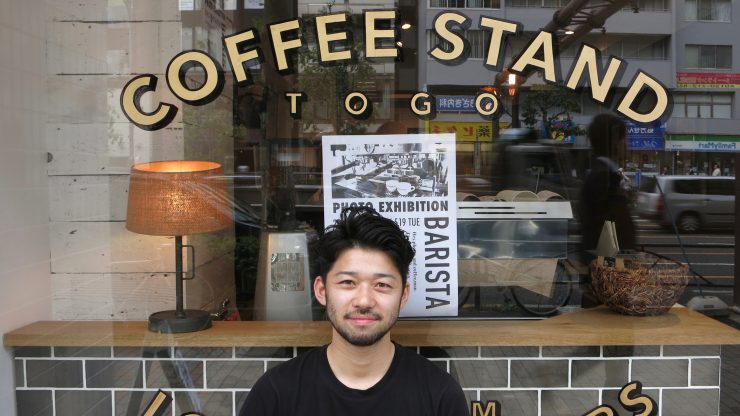
Yuji Otsuki
In my time spent covering coffee culture in Tokyo, one of my favorite events has to be the independent, charmingly grassroots Tokyo Coffee Festival, which launched last October at the Aoyama Farmers Market. The goal of this event, I wrote then, was to make the point that delicious coffee can be part of a good life, and not simply a market trend or sales opportunity. The event brought beautiful coffees and consumers together in an open-air market, and the result was a happy blending of roasters and professionals from across Japan interacting with curious coffee lovers and the newly indoctrinated.
Happily, the next edition of the grassroots Tokyo Coffee Festival is right around the corner, happening this coming May 21st and 22nd in Tokyo. I sat down with organizer and barista Yuji Otsuki to get the scoop on what is quickly becoming one of the city’s most beloved coffee events. In this interview, we talk about the coffee shops participating from across the country, how it all started, and what the future holds for coffee in Japan.
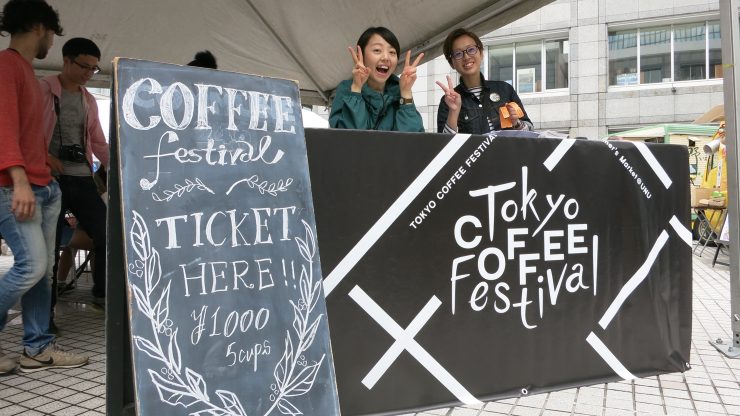
Scenes from last year’s festival (Hengtee Lim for Sprudge)
So the next Tokyo Coffee Festival is coming up really soon, huh?
The 21st and 22nd of May. We’ve done three already. It’s crazy how time flies.
Could you share with our readers how you first got interested in coffee?
I worked at a restaurant as a waiter, and the place did design cappuccinos. You know, the type that have “Happy Birthday” written on the froth, that kind of thing. So that’s when I first put hands on an espresso machine.
And one day, I saw a two-page spread of Four Barrel Coffee in a magazine, and I thought, “That’s the kind of place I want to work at.” It was so cool. Then Brutus magazine released a special issue dedicated to coffee. That was maybe five years ago. I bought it, and discovered Paul Bassett, and when I visited I liked it; I thought it was a cool place. So I started working there, and that’s how it all started.
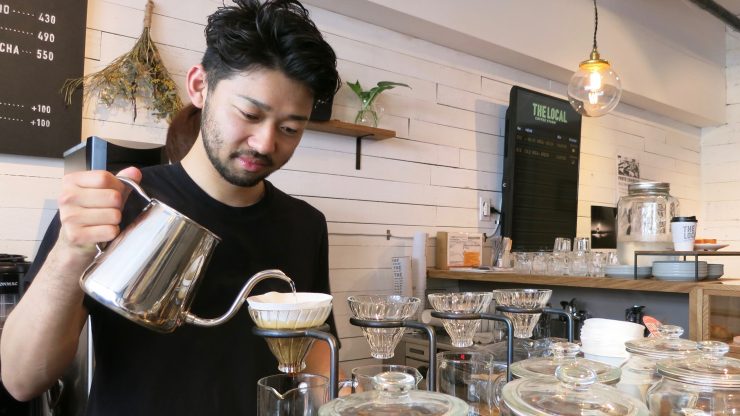
And you were there for a while?
Yeah, after my restaurant work, I was at Paul Bassett for four years, I think. Maybe three and a half. After that, I went to Glitch Coffee.
So when did things change from brewing coffee to organizing events?
Well, when I started at Glitch, I often talked with Kiyokazu Suzuki (the owner) about all sorts of things—events we wanted to do, shops we wanted to open. And he was like, “Well, you’re our organizer.” At the start that wasn’t my intent, but when that happened, I started thinking more about it.
And around the time Glitch opened, in April, Blue Bottle Coffee opened too, and the Third Wave coffee started getting more traction. Even the fashion term, “Third Wave boys” developed around it (seriously, it’s a thing here: in Japanese it’s pronounced, sa-do ue-bu kei danshi, or written as サードウエーブ系男子). I realized coffee was popular. It had gained some recognition, and there were huge lines to get into Blue Bottle. We talked about this kind of thing, and the way trends rise and fall, and we thought that if coffee was in a boom period then, maybe it would be over in a year, or maybe two years.
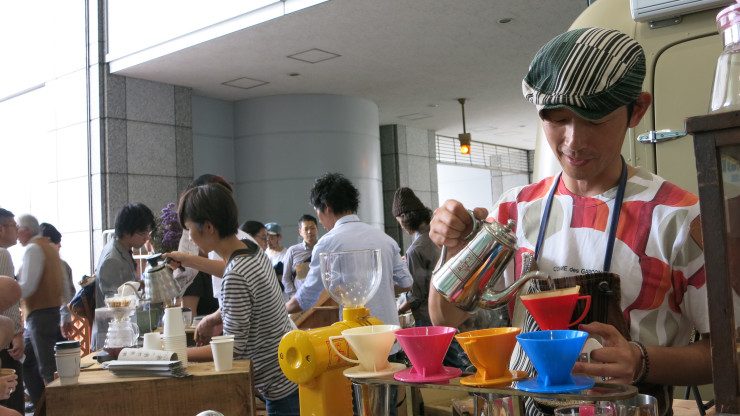
Scenes from last year’s festival (Hengtee Lim for Sprudge)
So the event is about keeping momentum and interest going?
Yes. But at the start, I really didn’t think we’d be able to do it. I just kept saying it, to all sorts of people. I want to do a coffee festival some time this year. I just kept saying it. And some people listened and wanted to help, and as a result, last year we did the Tokyo Coffee Festival and the Coffee Collection event.
At the last few events there was the idea that the Tokyo Coffee Festival was a way of showing people they can brew good coffee at home. Is that the same this year?
Yeah, the theme has stayed basically the same each time. But I also want more people to better understand our work as baristas and roasters. It’s easy to brew coffee, but the work is quite difficult. When we make coffee, we hide these difficulties to better create an enjoyable experience for customers. I want people to understand that.
At the same time, I want to raise appreciation for the people working in coffee—the baristas and the roasters. If you look at patissiers and chocolatiers, for example, it’s considered a good job. It’s a job that has a bit of prestige, and everyone knows what it is. I don’t know how much money a chocolatier actually makes, but people have an appreciation for that kind of work. But lots of people are still like, “Well, what’s a barista? What’s a roaster?” and many people still see it as something old salarymen get into when they retire.
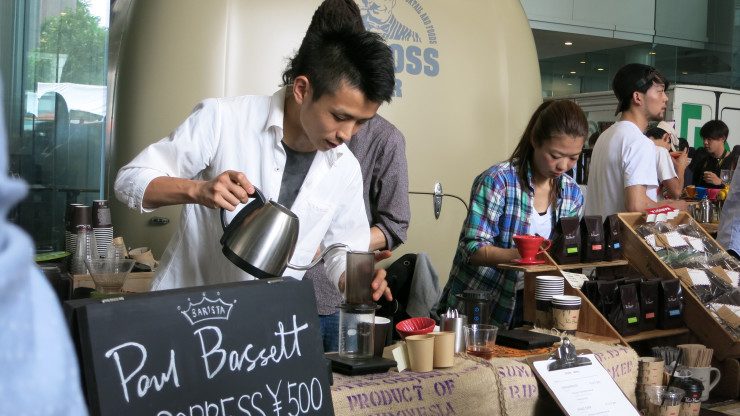
Scenes from last year’s festival (Hengtee Lim for Sprudge)
So it’s about getting people to know more about the profession, too.
Yes, yes. You know, espresso is difficult, and it is often too much for customers to understand. [So at the Tokyo Coffee Festival,] it doesn’t have to be just hand drip—it could be AeroPress or nel drip or whatever—we just want it to be a filter coffee brewed right in front of the customer.
So at the first Tokyo Coffee Festival you featured A Film About Coffee. What do you have planned for this time around.
This year we’re going to put a newspaper out. We’re going to interview each of the roasters and shops that are taking part, and we’ll make a newspaper out of them.
All of them? How many places are taking part this year?
On the coffee side of things, there are around 20 different shops taking part. But this year, we’ve put more focus on offering a better range of food and sweets. We aim to share coffee, of course, but it’s more than just the coffee; we want people to have a good time in a space that allows for a better enjoyment of the drink.
And there are coffee shops from all over Japan, right?
There are. We’ve got people coming from Iwate, Sendai, Niigata, Kumamoto, Shizuoka, Tochigi, Fukuoka, Wakayama, Shiga, and Hyogo.
We even have a coffee shop coming from Taiwan. Cafe Lulu. It’s crazy!
And they’re coming all the way from Taiwan especially for the event?
Yeah, and it’s not like they’re a Japanese-owned cafe either. They’re a Taiwanese shop coming to Japan. I’ve always thought it would be nice to have that—to have a couple of foreign coffee stands at our event so people could get to know them.
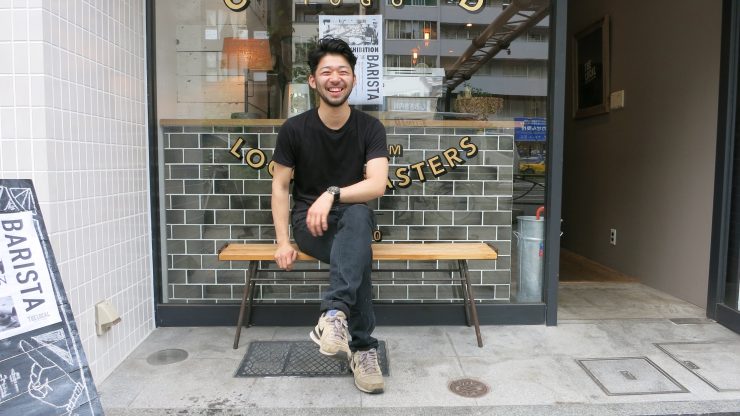
And how many events would you like to do with the rest of the year?
I’d really like to do the festival another two times this year. Maybe once in August/September, and again in December. And if possible, I want to do another Coffee Collection too.
Any last messages for the Sprudge readership?
To put it simply, I want to see the Japanese coffee scene keep up this energy. There are a lot of good coffee shops around now, so I’d love to see people search for these places—whether it’s through the Good Coffee website or whatever—and get out and experience them.
Also, we’ve got the Olympics in 2020, right? So, I want the scene to be even more energetic then. I’m doing seminars and study groups with baristas, and the youngest of them will be in their mid-twenties when the Olympics come here. The new generation is looking like a good one, so you can look forward to that!
The Tokyo Coffee Festival is on May 21 and 22, from 10:00 to 16:00. It’s held at the Farmers’ Market at the United Nations University at 5 Chome-53-70 Jingumae, Shibuya, Tokyo 150-8925. Visit their official website and Facebook event page.
Hengtee Lim (@Hent03) is a Sprudge.com staff writer based in Tokyo. Read more Hengtee Lim on Sprudge.
The post Tokyo Coffee Festival Founder Yuji Otsuki: The Sprudge Interview appeared first on Sprudge.

